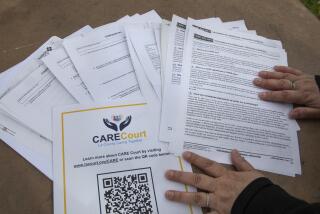Platform : Pre-Parole Psychiatric Exams: Are They Just?
- Share via
Serial rapist Reginald Donald Muldrew was denied parole after failing a last-minute psychiatric exam in December and will likely spend at least six more months in prison. Residents of Covina and the Antelope Valley had protested the possible release of the so-called pillowcase rapist into their communities.
Muldrew was the sixth sex offender since last March to be turned down for parole after failing the mental evaluation. Some say corrections officials use the exams, allowed under an obscure state code, as a pretext for keeping offenders like Muldrew behind bars. Muldrew, 46, was convicted on six counts of sexual assault and was a suspect in more than 200 rapes and 150 robberies in Los Angeles from 1975 to 1978. Critics contend the new policy takes authority away from the parole board and puts it into the hands of a single psychiatrist. RUTELY CONDE talked with representatives of both sides about the issue.
REBECCA
Raped by Muldrew in January, 1978
Psychiatric evaluations are a way to respect justice but they are really not accurate. Sometimes the perpetrator, if he has any kind of antisocial personality, knows how to pass the tests even though he is not fit to be released back into the community.
People who commit heinous crimes should serve their full sentence even if they pass the test. (Muldrew was sentenced to 25 years in 1978, but received time off for good behavior as allowed under state law.)
ROBERT PUGSLEY
Professor, Southwestern University School of Law, Los Angeles
Psychiatric evaluations are being used as a stop-gap device to prevent the parole release of people who have served their time. As such, they are debasing both medicine and medical psychiatry.
I’m not saying that the prisoners released on parole pose no threat to the community. My concern is that we have boxed ourselves in by a failure of foresight in proper planning that we are now reduced to grabbing for whatever utensil is handy, like an 11th-hour psychiatric evaluation, for the pretext of keeping these people off the street.
There are provisions within the California penal code notifying victims and their relatives and friends of the release of any prisoners within the 35-mile radius of where that person was victimized. It only solves part of the problem but at least it gives notice to the people most immediately affected by a particular individual.
ALMA HASSE
Helped organize protest of Muldrew’s release in Antelope Valley; Palmdale resident
Law enforcement officials say the highest incidence of repeat offenders, about 80%, are sexual offend ers. I talked to a number of people at the Department of Corrections in reference to Muldrew and the profile they had on him showed it wasn’t a matter of if he was going to (break the law) but when.
It is obvious that the judicial system is not working. If it was, Muldrew would not be getting out on the streets to begin with because this is not the first time he has been incarcerated. Psychiatric evaluations are a way to keep these people in jail. Had we not protested here, he would be in our back yard. It’s very important for people to get involved.
ALVA MORENO
Director, Avance Human Services Inc., a nonprofit organization that assists crime victims, Los Angeles
Psychiatric evaluations are fair because, at the time of parole, if prisoners are not emotionally and mentally fit to come out to the community, it gives the system more time to work with the person and keep him off the streets.
There needs to be a collaboration between law and medicine. The lawyers need to be more aware of the medical side and vice versa.
Unfortunately, we have such an overload on our parole agents that there isn’t a consistent follow-up on all parolees. We need to look at bringing in more agents. I don’t feel that psychiatric evaluations violate a client’s rights. You have to look out for the victims whose rights already been violated, who’s worried about them?
In the Muldrew case, the community got together and made sure he was not let out. The number of victims he had assaulted and the fact that he was being let go in the area where a lot of his victims were living made his a prominent case.
TIP KINDEL
Assistant director, California Department of Corrections
Parole, for probably 90% of the people in prison, is automatic under the determinate sentencing law. However, psychiatric evaluations are a tool to help determine whether prisoners have a severe enough mental disorder that would pose a threat to the community that cannot be treated in the community. If they fail, they remain in custody because the only really long term psychiatric care that is available is either through the prison system or through the Department of Mental Health and one of their mental health hospitals.
In a growing number of communities, there are special units within the parole system that deal with the intense supervision of sex offenders.
More to Read
Sign up for Essential California
The most important California stories and recommendations in your inbox every morning.
You may occasionally receive promotional content from the Los Angeles Times.













